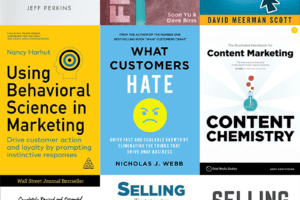Episode 93 of Yes, and Marketing
March 2020 was a wild time for all of us, but especially for Vaibhav Jain.
Vaibhav is the CEO of Hubilo, a company that, in March of 2020, was focused entirely on the in-person event industry. (ICYMI, in-person events work a little differently now.)
Vaibhav and Hubilo pivoted to virtual and hybrid events, and they recently announced a 125M funding round as a result.
On this episode, Vaibhav shares Hubilo’s story, including the wins, the roadblocks, and the twists involved with changing a startup’s entire business model. He covers:
- Why running a virtual event is harder than running a dating app
- How Hubilo’s engineering team stepped up during a pandemic
- Why marketers should care about virtual events
- How hybrid and virtual events compare to other lead gen tactics
- The future of events
Listen to the full conversation above or read on for our highlights. You can also check out clips from all our episodes on our show page.
Guest-at-a-Glance
???? Name: Vaibhav Jain
???? What he does: Founder and CEO of Hubilo
????️ Find Vaibhav on the web: Hubilo | LinkedIn | Twitter
???? Get smart: “Clients are not going to choose you because of the basic features that you provide, but clients are going to throw you away if the basic features don’t work for them.”
Top Takeaway
Virtual events are different — in a good way ????
It’s not just that virtual events are cheaper, more convenient, and globally accessible.
“The virtual event has become the best medium in the world to generate leads,” Vaibhav says.
Physical events are great for branding but not so good for data: You don’t have any insight into what attendees did or how they interacted with your event. With virtual events, however, you can see exactly what elements are resonating, who’s interested in what, and can target precise segments before, during, and after your event.
Virtual events also allow for what Vaibhav refers to as “speed networking,” in contrast to the serendipitous run-ins many of us consider one of the greatest advantages of physical events.
“At a physical event, you depend a lot on luck that if you’re able to bump into this person, then that person might help you out,” he explains. Hubilo removes luck from the process by allowing event organizers to create speed networking tables based around their attendees’ interests, allowing individuals to then be matched with someone who’s interested in the same topic.
“We are trying to connect people who have similar interests and want to talk about similar stuff at that point of time, which is usually not possible at a physical or a hybrid event, unless and until someone introduces you to that person.”
Episode Highlights
Why marketers should care about virtual events
“Virtual events have become a very good medium and cost-effective as well as effort-effective, in that they are able to reach to a global audience and not only engage them at the bottom or the middle of the funnel, but also for the top of the funnel.
When we talked to a lot of our clients, people used to spend about a million dollars to engage about thousand attendees. Now they spend a hundred thousand dollars to engage 10,000 attendees. It’s almost like a 100x value.”
What Hubilo’s development cycle looked like during its pivot
“We reduced our sprint cycle from two weeks to one week, where we used to launch some feature every week. We used to think about a feature on a Saturday, get it designed by Sunday, develop it by Wednesday, test it by Thursday, redevelop it by Friday and launch it by Saturday. That was our development cycle for about four to five months. Our weekends became blurry—it was almost like a free flowing time.”
One difference between physical vs. virtual events
“Just imagine: You would never usually start an event on time, unless and until all the people come in, but at a virtual event, you usually tend to start the event on time.
So you need to have a lot of fillers for the virtual audiences, because they’re not going to take a break of two hours—“Okay, let’s just take a break for two hours and then we’ll come back to the same session.” At that point, the audience is just going to drop.”
Why running a virtual event is harder than running a dating app
“In a dating app, the lifecycle of that particular app is pretty long, where once you download the app, that app will stay with you for a longer period of time, and then you can keep on connecting with those folks.
How a virtual event is different from these platforms is, you just get one or two days maximum to engage the audience and to really ensure that they are able to break the ice. So, the kind of engagements that you have to put across is almost 5x of what a dating app would look like.”
The changing role of virtual events
“It has been made a permanent space in the CMO budgets. CMOs are now thinking about virtual events as a different strategy—it is coming under the gamut of demand gen, whereas earlier events were only meant for branding purposes.
…Entire virtual event teams are going inside the demand gen teams, because it gives you a great way to increase your top of funnel leads.”
How virtual events compare to other lead gen tactics
“Let’s say that you see an ad on LinkedIn for a physical event that’s happening in Vegas maybe one month from now—you will not be sure whether you can make plans to attend it or not. Let’s say you see an e-book that is related to your topic. You might download it, or might not download it, because the ebook is evergreen. It is always going to be available.
But if there’s a virtual event that’s happening one month from now and it’s related to the topic of your interest—there’s an end date to it, you can easily attend it, and it is not evergreen. If you do not register for it now, then you might actually miss the opportunity, so that gives a kick to attendees to go ahead and register for the event.”
How the metaverse will impact the future of events
“Once the entire metaverse comes into the picture, which I’m hoping that it will in the next five to 10 years, I can sense that organizers would now have an ability to do four different type of events: physical events, hybrid events, virtual events, and meta events.
There are going to be multiple functionalities that would be needed at a metaverse level, where they would be able to do events at a venue within the metaverse, calling for attendees, NFT-based entries—if you’re attending an event, you will get an NFT for it, or because you have attended that event, instead of a ticket stub that you get from a movie hall, you will get something out of it. I can see all of these different industries actually colliding together.”
Career advice for young marketers
“Earlier you should explore what gives you a kick, whether it’s product marketing, brand or demand gen, and once you choose a particular field, it’s better to spend a lot of time in that and become a specialist and then move ahead with another one once you reach to a great leadership level.
I’ve seen a lot of people changing lanes in the earlier days because they did not research enough in terms of what suits them, so they ended up spending almost two to three years in something, not liking it, and then shifting. In that case it becomes difficult to present your case to an employer who would want to have you on board.”
Top Quotes
????️Vaibhav:
“Clients are not going to choose you because of the basic features that you provide, but clients are going to throw you away if the basic features don’t work for them.”
“The virtual event has become the best medium in the world to generate leads.”
“Event managers are usually the first ones to adopt any trend.”
“Our aim is to be as fast as we can be but not compromise on quality.”



